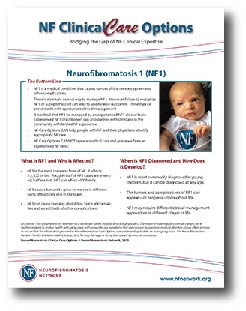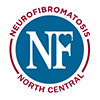NF Clinical Care Options
NF1 Clinical Care Options can help you bridge the gap of care between the local physician and the experienced NF1 practitioner. For the NF individual who has not had access to NF Clinics, we have published a comprehensive, scientific publication created for the express purpose of improved clinical care. Designed for both the patient and the local physician, often with limited NF knowledge, it includes information on the diagnosis and development of NF, specific tumor types, and a list of Neurofibromatosis Clinical Trials Consortium clinics whose practitioners, collectively are up-to-date on available treatments and who have agreed to be contacted by clinicians to learn more about NF or to refer a patient. It is critical that NF1 be managed by an experienced clinical team. It is our hope that through the NF1 Clinical Care program we can help to obtain such excellent care for all NF patients.
Coming soon …
Coming soon …
 One of the major obstacles associated with Neurofibromatosis is obtaining knowledgeable life-long clinical management for the medical issues that NF can cause. Individuals affected by NF need the care of one of the limited number of NF medical clinics. These NF clinics have the resources and expertise to treat the particular medical problems associated with NF. We seek to connect all individuals with NF to a clinic that specializes in the treatment of NF.
One of the major obstacles associated with Neurofibromatosis is obtaining knowledgeable life-long clinical management for the medical issues that NF can cause. Individuals affected by NF need the care of one of the limited number of NF medical clinics. These NF clinics have the resources and expertise to treat the particular medical problems associated with NF. We seek to connect all individuals with NF to a clinic that specializes in the treatment of NF.
Our health care system provides little assistance in finding the best medical care. Families are faced with the daunting task of trying to understand the pertinent medical issues and finding specialized care. Government publications point out that people can educate themselves and find the best health care professional by contacting patient advocacy groups like the Neurofibromatosis Network. The NF Network is aware of this shift to “consumer-driven care” so we have implemented a new program called NF1 Clinical Care Options.
What is NF?
Neurofibromatosis (NF) is a genetic disorder of the nervous system which causes tumors to form on the nerves anywhere in the body, at any time. This progressive disorder affects all races, all ethnic groups and both sexes equally. NF is one of the most common genetic disorders in the United States, impacting one in every 2,500. Neurofibromatosis affects about 128,000 Americans; this makes NF more prevalent than Cystic Fibrosis, hereditary Muscular Dystrophy, Huntington’s Disease and Tay-Sachs, combined.
Types of NF?
NF has three genetically distinct forms: NF-1, NF-2 and Schwannomatosis. Each are caused by mutations or deletions in specific genes and chromosomes. The effects of NF are unpredictable and have varying manifestations and degrees of severity. There is no known cure for any form of NF, although the genes for both NF-1 (chromosome 17) and NF-2 (chromosome 22) have been identified.
NF is an autosomal-dominant genetic condition. It is not contagious. Approximately 50% of those affected with Neurofibromatosis have a prior family history of NF. The other 50% of cases are the result of spontaneous genetic mutation. If an individual does not have NF, s/he cannot pass it on to his/her children.
Joseph Merrick, whose condition was depicted in the play and film, The Elephant Man, is often incorrectly thought to have had Neurofibromatosis. Merrick’s condition has been identified as Proteus Syndrome, a disorder with similarities to NF, but unrelated. To learn more about Proteus Syndrome, please visit the Proteus Syndrome Foundation.
RESOURCES
- Webinars for those impacted by NF
- Understanding Neurofibromatosis (ebook)
- Understanding Neurofibromatosis Type 2 (ebook)
In Their Own Words


